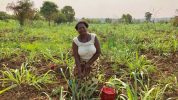Food production in Africa still relies almost exclusively on rain-fed agriculture, leaving farmers and rural communities vulnerable to increasingly erratic rainfall patterns and extreme climate conditions.
Yet there is vast potential to scale up irrigation, particularly across sub-Saharan Africa, to increase crop yields and improve resilience to climate shocks, the report finds.
Although irrigation in Africa has the potential to boost agricultural productivities by at least 50 percent, food production on the continent is almost entirely rainfed. The area equipped for irrigation, currently slightly more than 13 million hectares, makes up just 6 percent of the total cultivated area.
Water-Wise: Smart Irrigation Strategies for Africa, launched today at the Malabo Montpellier Panel Forum, highlights success stories from six African countries where greater levels of irrigation have led to better and longer harvests, higher incomes and better prospects for farmers.s.
Analysing best practices from Ethiopia, Kenya, Mali, Morocco, Niger and South Africa, the report authors find yields from irrigated crops can be double or more of comparable rain-fed yields on the continent. Moreover, the economic benefits of expanding areas under irrigation are estimated to be double the costs under climate change.
“This report shows the great potential for irrigation to improve agricultural output across Africa,” said the Right Honorable Dr Saulos Klaus Chilima, Vice President of Malawi and co-chair of the Malabo Montpellier Forum, which is presenting the report at its meeting in Rabat, Morocco.
“The analysis shows that there are lessons we can learn from our neighbours within the continent itself. Malawi is committed to expanding the area of arable land under irrigation and has already seen incomes rise by up to 65% where farmers participate in irrigation schemes.”
Just six per cent of cultivated land is currently irrigated in Africa, compared to 14% in Latin America and 37% in Asia.
The report authors found several common features among the countries that have made significant progress in expanding irrigation, and offered nine recommendations to help others meet food security and nutrition targets under the African Union’s Agenda 2063 and the Malabo Declaration.
“Dedicated, effective government institutions and significant increase in public investment for irrigation programs are critical,” said Dr. Ousmane Badiane, Malabo Montpellier Panel co-chair and Africa director for the International Food Policy Research Institute (IFPRI).
“In addition, interventions aimed at easing access to finance and building skills for operation, repair and maintenance of equipments are some of the key factors that have enabled countries to make considerable progress.
“Partnership with the private sector and farming communities and improved regulations for safe and sustainable use of water, are other driving factors.”
The report highlights the business case for irrigation development, pointing out that in the most vulnerable parts of Africa, irrigated agriculture also means farmers can extend the growing season, increase productivity and incomes, and improve their livelihoods.
In Niger, one of the countries with the fastest pace of irrigation expansion, up to 20 per cent of agricultural gross domestic product (GDP) is generated through irrigated agriculture.
“Two things need to come together in smart irrigation: first, robust technology that saves water and energy and can be sustained locally, and second, sound and fair local organizations with women and men farmers in the lead of their irrigation,” said Professor Joachim von Braun, Malabo Montpellier Panel co-chair and director of the Center for Development Research at Bonn University, Germany.
“Assuring both of these conditions call for wise policy design, not just top down directives, and the income opportunities will be attractive for rural youth.”
But report authors reiterated that expansion must be planned carefully to avoid adverse impacts on the environment and human health.
“We must elevate irrigation to a top policy priority to bring it to scale as a key ingredient to ensure the continent’s food security in the face of more extreme weather conditions,” said Dr. Agnes Kalibata, former agriculture minister for Rwanda and a member of the Malabo Montpellier Panel. “We need to scale new models that put emphasis on farmer-led irrigation to scale household level resilience to shocks.
“Whether small-scale and farmer-led or large-scale, it is crucial that any irrigation systems and technologies supported by governments or the private sector will need to be designed to fit local environments and meet the needs of smallholder farmers.”
The Malabo Montpellier Panel convenes 17 leading experts in agriculture, ecology, nutrition and food security to guide policy choices by African governments to accelerate progress towards food security and improved nutrition in Africa.
The Panel identifies areas of progress and positive change across the continent and assesses what successful countries have done differently. It then identifies the most important institutional innovations and policy and program interventions that can be replicated and scaled up by other countries.
It is hosted by the West and Central African Office of the International Food Policy Research Institute, the University of Bonn and Imperial College London and is headquartered in Dakar Senegal. It is co-chaired by Dr. Ousmane Badiane, Africa Director at IFPRI and Professor Joachim von Braun, Director, Center for Development Research, University of Bonn.
The Malabo Montpellier Forum provides a platform to promote policy innovation by using the evidence produced by the Panel to facilitate dialogue and exchange among high-level decision-makers on African agriculture, nutrition and food security.
Meetings of the Forum are guided by the technical reports prepared by the members of the Malabo Montpellier Panel. It is co-chaired by the Right Honourable Saulos Klaus Chilima, Vice President of the Republic of Malawi and His Excellency Abdoulaye Bio Tchané, Minister of State for Planning and Development of the Republic of Benin.

